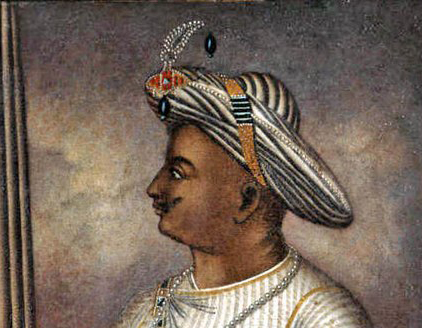Tipu Sultan | 20 Jul 2021
Why in News
Recently, naming a garden on Tipu Sultan in Mumbai sparked a controversy.
Key Points
- Brief Profile:
- Born in November 1750, Tipu Sultan was Haidar Ali’s son and a great warrior, also known as the Tiger of Mysore.
- He was a well educated man fluent in Arabic, Persian, Kanarese and Urdu.
- Mysore had grown in strength under the leadership of powerful rulers like Haidar Ali (ruled from 1761 to 1782) and his famous son Tipu Sultan (ruled from 1782 to 1799).
- Tipu introduced a number of administrative innovations during his rule, including his coinage, a new Mauludi lunisolar calendar, and a new land revenue system which initiated the growth of Mysore silk industry.
- Embracing western military methods like artillery and rockets alongside traditional Indian weapons including war elephants, he ensured his forces could overwhelm his Indian rivals and match the British armies sent against him.
- Maintenance of Armed Forces:
- He organised his army on the European model with Persian words of command.
- Though he took the help of the French officers to train his soldiers, he never allowed them (French) to develop into a pressure group.
- He was well aware of the importance of a naval force.
- In 1796, he set up a Board of Admiralty and planned for a fleet of 22 battleships and 20 large frigates.
- He established three dockyards at Mangalore, Wajedabad and Molidabad. However, his plans did not fructify.
- He organised his army on the European model with Persian words of command.
- Fought Against Marathas:
- In 1767, Tipu commanded a corps of cavalry against the Marathas in the Carnatic (Karnataka) region of western India, and he fought against the Marathas on several occasions between 1775 and 1779.
- Role in Anglo-Mysore Wars:
- British saw Haidar and Tipu as ambitious, arrogant and dangerous – rulers who had to be controlled and crushed.
- Four wars were fought with Mysore (1767-69, 1780-84, 1790-92 and 1799).
- 1767-69: Treaty of Madras.
- 1780-84: Treaty of Mangalore.
- 1790-92: Treaty of Seringapatam.
- 1799: Subsidiary Alliance.
- Only in the last – the Battle of Seringapatam – did the Company ultimately win a victory. Tipu Sultan was killed defending his capital Seringapatam.
- Mysore was placed under the former ruling dynasty of the Wodeyars and a subsidiary alliance was imposed on the state.
- Other Related Points:
- He was also a patron of science and technology and is credited as the ‘pioneer of rocket technology’ in India.
- He wrote a military manual (Fathul Mujahidin) explaining the operation of rockets.
- Tipu was a great lover of democracy and a great diplomat who gave his support to the French soldiers at Seringapatam in setting up a Jacobin Club in 1797.
- Tipu himself became a member of the Jacobin Club and allowed himself to be called Citizen Tipu.
- He planted the Tree of Liberty at Seringapatam.
- He was also a patron of science and technology and is credited as the ‘pioneer of rocket technology’ in India.
Subsidiary Alliance
- In 1798, it was introduced by Wellesley in India, the ruler of the allying Indian state was compelled to pay a subsidy for the maintenance of British army in return for getting protection from the British against their enemies.
- Those native princes or rulers who would enter into the Subsidiary Alliance were not free to declare war against any other power or enter into negotiations without the consent of the British.
- The Subsidiary Alliance was a policy of non-interference in the internal affairs of the allied state, but this was a promise seldom kept by the British.
- The payment of the arbitrarily-fixed and artificially-bloated subsidy invariably disrupted the economy of the state and impoverished its people.
- On the other hand, the British could now maintain a large army at the cost of the Indian states.
- They controlled the defence and foreign relations of the protected ally, and had a powerful force stationed at the very heart of his lands.
- Lord Wellesley signed his first Subsidiary Treaty with the Nizam of Hyderabad in 1798.
- The Nawab of Avadh was forced to sign a Subsidiary Treaty in 1801.
- Peshwa Baji Rao II (Maratha) signed the Subsidiary Treaty at Bassein in 1802.

